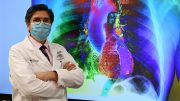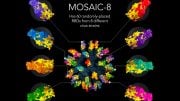
Research has discovered that many COVID-19 patients produce immune responses against their own body’s tissues or organs.
A University of Birmingham-led study funded by the UK Coronavirus Immunology Consortium has found that many patients with COVID-19 produce immune responses against their body’s own tissues or organs.
COVID-19 has been associated with a variety of unexpected symptoms, both at the time of infection and for many months afterward. It is not fully understood what causes these symptoms, but one of the possibilities is that COVID-19 is triggering an autoimmune process where the immune system is misdirected to attack itself.
The study, published on June 3, 2021, in the journal Clinical & Experimental Immunology, investigated the frequency and types of common autoantibodies produced in 84 individuals who either had severe COVID-19 at the time of testing or in the recovery period following both severe COVID-19 and those with milder disease that did not need to attend hospital. These results were compared to a control group of 32 patients who were in intensive care for another reason other than COVID-19.
An autoantibody is an antibody (a type of protein) produced by the immune system that is directed against one or more of the individual’s own proteins and can cause autoimmune diseases. Infection can, in some circumstances, lead to autoimmune disease. Early data suggest that SARS-CoV-2 infection can trigger long-term autoimmune complications and there are reports of SARS-CoV-2 infection being associated with a number of autoimmune disorders including Guillain-Barre Syndrome.
Supported by UK Research and Innovation (UKRI) and the National Institute for Health Research (NIHR), the study found higher numbers of autoantibodies in the COVID-19 patients than the control group and that these antibodies lasted up to six months.
Non-COVID patients displayed a diverse pattern of autoantibodies; in contrast, the COVID-19 groups had a more restricted panel of autoantibodies including skin, skeletal muscle, and cardiac antibodies.
The authors also find that those with more severe COVID-19 were more likely to have an autoantibody in their blood.
First author Professor Alex Richter, of the University of Birmingham, explained: “The antibodies we identified are similar to those that cause a number of skin, muscle and heart autoimmune diseases.
“We don’t yet know whether these autoantibodies are definitely causing symptoms in patients and whether this is a common phenomenon after lots of infections or just following COVID-19. These questions will be addressed in the next part of our study.”
Senior author Professor David Wraith, of the University of Birmingham, adds: “In this detailed study of a range of different tissues, we showed for the first time that COVID-19 infection is linked to production of selective autoantibodies. More work is needed to define whether these antibodies contribute to the long-term consequences of SARS-CoV-2 infection and hence could be targeted for treatment.”
Professor Paul Moss, Principal Investigator of the UK Coronavirus Immunology Consortium and Professor of Haematology at the University of Birmingham added: “This is an interesting study that reveals new insights into a potential autoimmune component to the effects of COVID-19. Research like this has been made possible by the huge collaborative efforts made by those that are a part of the UK Coronavirus Immunology Consortium. This study is another important step towards delivering real improvements in prevention, diagnosis, and treatment of COVID-19 to patients.”
The study participants were separated into four cohorts:
- Group one: 32 individuals sampled during their stay in intensive care for reasons other than COVID-19. 41% of individuals had autoantibodies. In this group, there were many different causes of their illness (over half was pneumonia) and autoantibodies were found against nearly all of the different autoantigens examined, indicating a more random distribution.
- Group two: 25 individuals who were sampled during their stay in intensive care following a diagnosis of severe COVID-19. 60% had autoantibodies. Of those who tested positive for autoantibodies, 41% had epidermal (skin) antibodies, while 17% had skeletal antibodies.
- Group three: 35 individuals who had been admitted to intensive care with COVID-19, survived and were sampled three to six months later during routine outpatient follow-up. 77% of individuals had autoantibodies. Of those who tested positive for autoantibodies, 19% had epidermal (skin) antibodies, 19% had skeletal antibodies, 28% had cardiac muscle antibodies; and 31% had smooth muscle antibodies.
- Group four: 24 healthcare workers sampled one to three months after mild to moderate COVID-19 that did not require hospitalization. 54% of individuals had autoantibodies. In those who tested positive for autoantibodies, it was against only four autoantigens: 25% had epidermal (skin) antibodies; 17% had smooth muscle antibodies; 8% had anti-neutrophil cytoplasm (ANCA) antibodies that target a type of human white blood cells; and 4% had gastric parietal antibodies which are associated with autoimmune gastritis and anemia.
Reference: “Establishing the prevalence of common tissue-specific autoantibodies following SARS CoV-2 infection” by Alex G. Richter, Adrian M. Shields, Abid Karim, David Birch, Sian E. Faustini, Lora Steadman, Kerensa Ward, Timothy Plant, Gary Reynolds, Tonny Veenith, Adam F. Cunningham, Mark T. Drayson and David C. Wraith, 3 June 2021, Clinical & Experimental Immunology.
DOI: 10.1111/cei.13623
The University of Birmingham is ranked amongst the world’s top 100 institutions, and its work brings people from across the world to Birmingham, including researchers and teachers and more than 6,500 international students from nearly 150 countries.
The UK Coronavirus Immunology Consortium brings together 20 UK immunology centers of excellence to research how the immune system interacts with SARS-CoV-2 to help us improve patient care and develop better diagnostics, treatments, and vaccines against COVID-19. It is jointly funded by UK Research and Innovation (UKRI) and National Institute for Health Research (NIHR) and supported by the British Society for Immunology.
The National Institute for Health Research (NIHR) is the nation’s largest funder of health and care research. The NIHR:
- Funds, supports, and delivers high-quality research that benefits the NHS, public health, and social care
- Engages and involves patients, carers, and the public in order to improve the reach, quality, and impact of research
- Attracts, trains and supports the best researchers to tackle the complex health and care challenges of the future
- Invests in world-class infrastructure and a skilled delivery workforce to translate discoveries into improved treatments and services
- Partners with other public funders, charities, and industry to maximize the value of research to patients and the economy
The NIHR was established in 2006 to improve the health and wealth of the nation through research, and is funded by the Department of Health and Social Care. In addition to its national role, the NIHR supports applied health research for the direct and primary benefit of people in low- and middle-income countries, using UK aid from the UK government.









Very interesting article. I have RR MS. Aubagio appears to have slowed the progressionof the MS.
Plans were made to flush the Aubagio out of my system. But I feared an MS relapse. Therefore, I continued taking Aubagio. My body seemed to have no negative reaction to both of the shots.
I would rather risk covid vs MS progression. So far I am doing well in spite of MS and the pandemic.
The article makes me think. Can this virus be studied for links chemically to MS and how the body and its chemistry are intertwined.
There is something hidden.
It’s the vaccine you lying Communist sacks of human sh*t!
Sars cov 2 has a 99.9998% to 99.9997% survival ratio absent hospitalization and prescription antibiotics depending on age and health problems
I think it was somehow known to the doctors before this research. That’s why they use *Steroids* that limits our immune system in such a way that it doesn’t hurt our tissues.
There is no COVID. COVID-19 has never been isolates. But there is a COVID vaccine based on a synthetic drug. The vaccine produces toxic spike proteins. These proteins cause autoimmune reactions. The vaccine are given secretly in COVID tests. The spike proteins are transmitted for weeks from vaccinate persons to others via saliva and other bodily fluids.
…what propaganda. Everyone who knows anything knows that the experimental gene therapy is what is killing and harming these people. Scitechdaily sounds like a government-shill-rag-site that is paid to pass on this garbage. I hope someone who loses a love one insures that people like this site pay the price for their lies.
I have a PhD in economics/ statistics. Have had many autoimmune and infectious diseases since infancy. Even polio in 1946. I have been studying many of these issues since the Sixties. No one seems interested in MY experience.